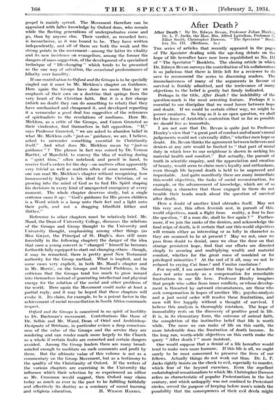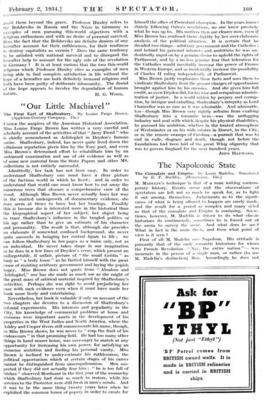After Death?
After Death ? By Dr. F.dwyn Bevan, Professor Julian Huxley, Dr. L. P. Jacks, the Hon. Mrs. Alfred Lyttelton, Professor G. Elliot Smith, Christopher Dawson. "The Spectator" Book- lets No. III. (Methuen. Is.) THE series of articles that recently appeared in the pages of The Spectator dealing with the age-long debate on the hope of life hereafter have now been republished as No. III of "The Spectator" Booklets. The closing article in which
Dr. Edwyn Bevan surveys the contribution of his collaborators is so judicious that there is little left for a reviewer to do
save to recommend the series to discerning readers. The inconclusiveness of many of the arguments in favour of survival is frankly admitted, and the irrelevance of many objections to the belief is gently but firmly indicated. Perhaps in the title, After Death ? the indelibility of the
question-mark is the most arresting feature. Perhaps it is essential to our discipline that we must hover between hope and doubt. If we could be certain either way, we might be poorer creatures. So long as it is an open question, we shall feel the force of Aristotle's contention that so far as possible we should live as immortals.
I am not sure that Dr. Bevan is quite just to Professor Hrodey's view that "a great part of conduct and ofman's moral judgements would not externally differ," whetherTnen hope or doubt. Dr. Bevan thinks the agreement between believers and deniers at any rate would be limited to "that part of moral duty in which love to our neighbour is shown in seeking his material health and comfort." But actually, the pursuit of truth in scientific enquiry, and the appreciation and creation of beauty, would seem to claim men's loyalty and enthusiasm, even though life beyond death is held to be unproved and improbable. And quite manifestly there are many immediate this-world objectives, the tasks of social reconstruction, for example, or the advancement of knowledge, which are of so absorbing a character that those engaged in them do not trouble their heads much about the question of survival after death.
Here a doubt of another kind obtrudes itself. May not
this very zest, this often feverish zest, in pursuit of this- world objectives, mask a flight from reality, a fear to face ,the question, "If a man die, shall he live again ? " Further- more, if we join the ranks of the deniers, and acknowledge the final reign of death, is it certain that our this-world objectives will remain either as interesting or as lofty in character as they are assumed to be at present ? May we not, once we pass from doubt to denial, once we close the door on that strange persistent hope, find that our efforts are directed- simply to securing and multiplying wealth and material
comfort, whether for the great mass of mankind or for privileged minorities ? At the end of it all, may we not be
reduced to crying Cui bono ? and V afflicts vanikaum ?
For myself, I am convinced that the hope of a hereafter does not arise merely as a compensation for remediable frustrations in our life here. Professor Huxley imagines that people who suffer from inner conflicts, or whose develop- ment is thwarted by outward circumstances, are those who seek compensation in hopes of another life ; psycho-analysis and a just social order will resolve these frustrations, and men will live happily without a thought of survival. I believe this analysis is thoroughly mistaken. The hope of immortality rests on the discovery of positive good in life.
It is, in its elementary form, the outcome of animal faith, the completion of the instinctive belief that life is worth while. The more we can make of life on this earth, the more intolerable does -the frustration of death become. In
the long run, worth-while objectives on this earth make the query "After death ? " more insistent.
One would suppose that a denial of a life hereafter would tend to make men more humane. If this life is all, we ought surely to be most concerned to preserve the lives of our fellows. Actually things do not work out thus. Dr. L. P. Jacks rightly insists on the check to evil, especially to murder, which fear of the beyond exercises. Even the repellent eschatological sensationalism to which-Mr. Christopher Dawson refers as characteristic of popular Protestantism in the last century, and which unhappily was not confined to Protestant circles, served the purpose of keeping before men's minds the possibility that the consequences of their evil deeds might
await them beyond the grave. Professor Huxley refers to the Bolsheviks in Russia and the Nazis in Germany as examples of men pursuing this-world objectives -with a religious enthusiasm and with no desire of personal survival. Does the fact that the Bolsheviks are definite deniers of any hereafter account for their ruthlessness, for their readiness to destroy capitalists as vermin ? Does the same tendency to be satisfied with national survival and to disregard the hereafter help to account for the ugly side of the revolution in Germany ? It is at least curious that the two this-world religions which Professor Huxley cites as examples of men being able to find complete satisfaction in life without the hope of a hereafter are both definitely immoral religions and both have been guilty of deliberate inhumanity. The denial of the hope appears to involve the degradation of human









































 Previous page
Previous page